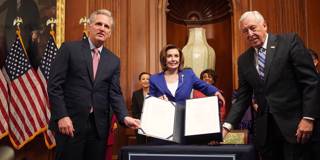With sovereign-bond markets still showing little concern for the massive levels of borrowing and spending across advanced economies, it is tempting to think that there is effectively no limit to further stimulus. But we owe it to future generations to recognize how spending today could affect investment tomorrow.
CHICAGO – Advanced economies have already spent enormous amounts providing pandemic relief to households and small- and medium-size businesses. The International Monetary Fund’s June outlook estimates that, including fiscal measures and credit guarantees, spending reached approximately 20 percentage points of GDP. In the United States, Congress is considering new spending ranging from 5% of GDP (Republicans) to 15% (Democrats). And still more government spending, and thus borrowing, will be needed by the time the pandemic is behind us.

CHICAGO – Advanced economies have already spent enormous amounts providing pandemic relief to households and small- and medium-size businesses. The International Monetary Fund’s June outlook estimates that, including fiscal measures and credit guarantees, spending reached approximately 20 percentage points of GDP. In the United States, Congress is considering new spending ranging from 5% of GDP (Republicans) to 15% (Democrats). And still more government spending, and thus borrowing, will be needed by the time the pandemic is behind us.